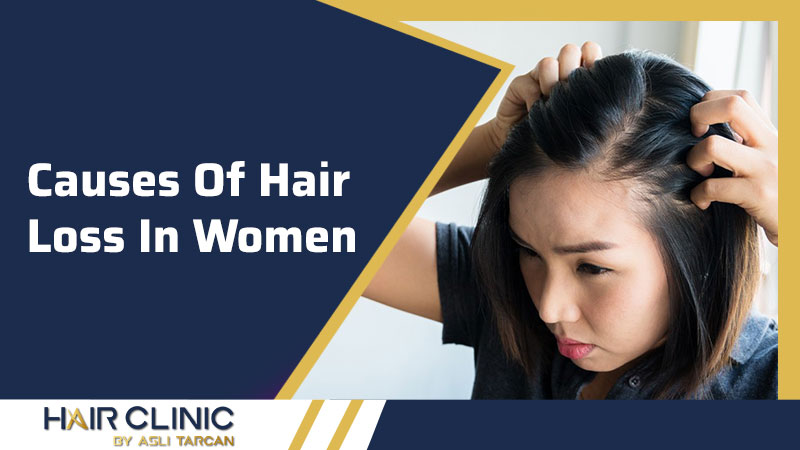Causes Of Hair Loss In Women. Female hair loss is real! The number of women who have full hair on their heads throughout their lives represents less than 45% of the world’s female population. We will list the causes of hair loss in women below.
Whether it is medical conditions, stress, or hormonal imbalances, the factors that contribute to hair loss in women are abundant. In this article, let’s take a look at all the different types of hair loss, their causes, symptoms, and treatment options.
Types of alopecia (hair loss) in women
Androgenetic alopecia
If you have a family history of hair loss and have started to notice unusual rates of hair loss, you are probably experiencing androgenetic alopecia. Also known as female hair loss, this is due to genetics and is the highest cause of hair loss in women.
You may notice excessive hair loss between the ages of 12-40 with this condition. You will also notice that your hair starts to fall out right from the middle of your scalp.
Alopecia Areata
Alopecia areata, an autoimmune disease that causes hair loss in women on the scalp in patches. This can even develop into totalis or Universalis alopecia. Alopecia totalis includes baldness of the entire scalp. Alopecia Universalis is rare and affects the whole body.
Cicatricial Alopecia
Cicatricial alopecia is a condition in which the body’s immune system attacks the hair follicles, thus preventing the growth of new hair. This condition can lead to irreversible hair loss. When your hair falls out, it is replaced with scar tissue.
Traumatic alopecia
This happens when your hair has been damaged by styling products that can damage or break it. Products that produce heat, hot combs, and certain chemicals can lead to excessive dryness and frizz.
They can remove the essential oils and moisture of the scalp required by your hair. Damage to the hair shaft leads to easy breakage.
Signs of hair loss in women
- Dilution at the top of your head. Men notice bald spots more often, while women will notice a difference in density.
- Bald patches appear in some cases.
- If you have suffered emotional trauma in the recent past, you may notice that your hair falls out in clumps in the shower or while you are brushing.
- Complete hair loss can also be observed after certain medical treatments such as chemotherapy.
What can cause hair loss in women & Causes of hair loss in women?
Medical diseases
Several medical conditions can cause hair loss in women, from Hodgkin’s disease to Scelorama and Addison’s disease. The most common conditions are listed below:
Hypothyroidism
Hypothyroidism is a condition in which your thyroid gland does not produce enough thyroid hormones. Thyroid hormones help regulate the energy your body uses. Any change in your thyroid hormone levels can affect other processes in the body, including the growth of new hair follicles and strands.
Subculture
The pituitary gland is located in the brain and regulates almost all the hormones produced by your body. Any disturbance in secretion can affect various body processes, including hair growth.
Hashimoto’s disease
This disease is characterized by an attack on the thyroid gland by the immune system. It can affect the secretion of the thyroid hormone, resulting in hair loss.
Systemic lupus erythematosus
This is another autoimmune condition in which the body triggers immune system responses, attacking healthy cells that it considers foreign.
Lichen Planus
This is an autoimmune disease that leads to enlarged bumps, usually around wounds. Sometimes it can even affect the mouth. Lichen planus can be quite itchy and can lead to hair loss and scarring due to constant itching.
Tinea Capitis
A fungal infection that affects the scalp, causing circular, itchy rashes that are still contagious. The infection can cause hair loss if left untreated in its early stages.
Celiac disease
Gluten is a protein found in certain foods. Celiac disease is a condition in which gluten causes intestinal damage. This can lead to malnutrition, affecting the growth of your hair.
It is always best to address the underlying cause before treating a symptom. If you are experiencing hair loss due to any of these conditions, treat the condition first.
Hormonal imbalances
Hormones play an important role in determining the growth of your hair. Women go through a series of hormonal changes throughout their lives. A fluctuation of these hormones can lead to hair loss.
Testosterone is a male sex hormone that is also found in female bodies. High levels of this hormone are associated with hair loss. Dihydrotestosterone is a derivative of testosterone and is mainly responsible for hair loss. It binds to the receptors in your hair follicles, interfering with the hair growth process.
Hair loss after childbirth
This is due to the decrease in female hormones – estrogen and progesterone – after childbirth. The drop in these hormones occurs because the body is preparing to return to normal. This happens when you may notice a sudden loss of hair strands to a great extent.
Menopause
Hair loss occurs in menopausal women due to a decrease in the hormones estrogen and progesterone. Your childhood is coming to an end, which is why the body does not require these hormones at such high levels.
PCOS
PCOS is a condition in which androgen levels tend to be high in women. This can be the cause of hair loss.
Stress
Stress can even cause hair loss in both men and women. Anything that can stress your body mentally or physically can slow down certain processes such as the production of hair follicles.
Telogen Effluvium
This is a temporary condition of hair loss that occurs when the body is injured by something. It could be a stressful event such as a loss in one’s life or a major change such as childbirth.
This can disrupt the life cycle of hair and slow it down, causing hair loss. If you notice thinning hair, you may be very stressed. You may even notice a 3-month delay in increasing hair loss levels after a stressful event.
High fever, stress, infections, and diet can also cause telecon cells. Some medications can also help with telogen effluvium hair loss. These include retinoids, antidepressants, beta-blockers, and non-steroidal anti-inflammatory drugs (NSAIDs).
We have listed the causes of hair loss in women. A change in hormones, stress, and genes contribute to hair loss in women. Some medical conditions that involve stopping hormones can also cause hair loss. However, topical, oral, and invasive treatments are available to stimulate hair growth and improve these conditions. It is always advisable to treat the underlying cause before treating its symptoms. If you have medical problems, treating them can even reduce hair loss.



